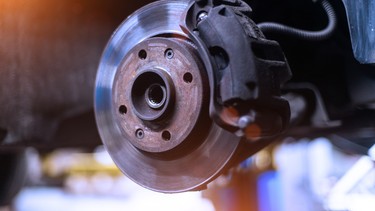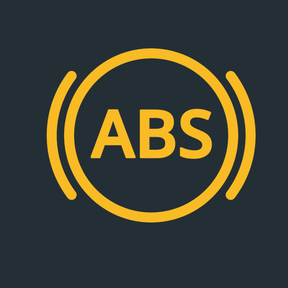Our used car expert guides you through some common brake noises and symptoms and explains which indicate problems that need attention

Article content
If you notice something strange about the way the brakes in your car or truck feel and head to your favourite search engine to look for answers, then you’re a completely normal human being.
Advertisement 2
Article content
Below, we’ll answer 7 of the internet’s most popular search questions related to diagnosing braking system trouble, and provide some advice and context along the way. If you’ve landed on this page looking for help diagnosing a problem with the brakes in your car or truck, read on for more information and then make tracks to your nearest trained technician for a closer look.
Remember: stopping isn’t optional and an inspection by a professional (not a web search) is the best way to keep your brakes in tip-top shape.
Is it normal for my brakes to squeak or squeal?
That depends on the cause.
Brake pads have a metal tab designed to contact the vehicle’s spinning metal brake rotor when they’re worn down, and the irritating squeaking sound is your reminder to call and schedule a brake job. If you’ve got older brake pads that are worn down and need replacement, then hearing a squeaking or squealing sound is normal.
Advertisement 3
Article content
Brakes designed for heavy-duty work, like those used in extreme-performance cars, may be prone to squeaking too—and that’s even if they aren’t worn out.
Thing is, your brakes can also make squeaking sounds in certain situations when they’re wet, when a certain type of brake pad is used, when certain parts of your braking system are improperly lubricated, when your brake rotors are rusty, and when your brakes are either cold or brand spanking new.To summarize, squeaking brakes can (but may not) indicate a problem. If in doubt, have your vehicle checked out by a professional, especially if paired with any unusual sensations while braking.
Your brake pads can last anywhere from a year to several years, depending on various factors including the quality of brake pads you install, driving habits, locale, vehicle maintenance, and more. In this article from repairsmith.com, the topic of brake pad life is broken down further though most drivers can expect a set of brakes to last them about 70,000 kilometers. Ask your mechanic to update you on the brake pad wear level whenever you’re getting an oil change or seasonal tire swap, so you’re always up to date on the remaining life of your brake pads. Remember that while many braking system troubles are easy to diagnose with your ears, it’s not just about sound.
Advertisement 4
Article content

Is it normal for my brakes to get hot?
Yes.
One of your braking system’s jobs is to generate tremendous amounts of friction that’s used to slow your car or truck down. This friction results in heat, which you’ll sometimes notice as you walk past your car after parking it from a drive.
Heat radiating out from behind each of your car’s wheels for a few minutes after you drive is normal and expected, especially if you’ve been towing a trailer, travelling at high speed, or travelling on hilly terrain.
Is it normal for new brakes to smell or smoke?
Smell can be normal, but smoke should not be.
New brake parts may emit unusual odours and small amounts of smoke as components heat cycle and get settled. Though this isn’t the case with all new brake parts, the presence of a small amount of occasional smoke and a warm, sweet metallic odour that goes away after a few drives can be considered normal.
Advertisement 5
Article content
Note that hot brakes can also emit steam when splashed by snow, slush or water. Under hard braking, you may notice a hazy cloud of brake pad material that seems to eject from behind the front wheels, too. Both are normal.
If your brakes are not new, or haven’t been serviced recently, proceed with extreme caution if you notice the sudden onset of visible smoke or an unfamiliar odour. Both could be signs of serious braking system trouble, and your vehicle should be seen by a professional right away.
-
![Your Questions Answered: Tire pressure and TPMS sensors]()
Your Questions Answered: Tire pressure and TPMS sensors
-
![Troubleshooter: Do your wheels need a balance, an alignment, or a wash?]()
Troubleshooter: Do your wheels need a balance, an alignment, or a wash?
Is it normal for my brake pedal to go all the way to the floor?
No, something is seriously wrong with your brakes if your brake pedal goes all the way to the floor.
Advertisement 6
Article content
A healthy braking system should be able to quickly stop your vehicle with minimal pedal effort. Your brake pedal should resist and ‘firm up’ the harder you press it. A brake pedal that feels soft, spongy or limp, or one that sinks towards (or contacts) the firewall or ‘floor’ of the vehicle behind it is a sign of danger. Braking performance is compromised and you may have a fluid leak, a loss of hydraulic pressure, or one or more worn or damaged braking system parts.
If your brake pedal feels limp or goes all the way to the floor, avoid driving and have a technician investigate right away.
Is it normal for my brakes to grind or scrape?
No, but there’s a possible caveat.
Other than a squeaking or squealing sound in certain situations, there’s no good reason for your brakes to be making any noise.
Advertisement 7
Article content
A grinding or scraping sound from your vehicle’s brakes indicates one or more problems ranging from worn out parts to excessive rust to physical damage to the presence of some foreign object or contamination between your pads and rotors.
Still, a slight scraping or grinding sensation may be considered normal for the first few moments of a drive after your car’s been parked for an extended period, as surface rust on the brake rotors is removed by the brake pads during your first few stops.
If the scraping or grinding sensation sticks around longer than a moment or two, have a professional investigate.
Is it normal for my brakes to rust?
Yes.
Brakes are made of metal parts which can rust. Timely servicing, inspection and lubrication of braking system components can mitigate the effects of rust over time. Failing to have your brakes regularly serviced and inspected is a great way to drive up the operating costs of your vehicle, as new parts may be required if rust isn’t managed on an ongoing basis.
Advertisement 8
Article content
Brake rotors can also rust, but that’s usually no cause for alarm. If your car’s been parked in the rain for a few days and you notice your normally-shiny brake rotors are dull and rusty looking, just drive your car.
After using the brakes a few times, the rust will be removed by the brake pads. Until it is, your brakes may squeal or scrape slightly.
Parking your vehicle for an extended period outdoors can allow brake rotors and other parts to rust severely, requiring professional care. Keep this in mind if you’re bringing a car back out after an extended time in storage.

Is it normal for my ABS to kick in on dry pavement?
Your car’s Anti-Lock Braking System (ABS) is designed to maintain vehicle steerability under severe braking. When your ABS engages, you’ll likely notice a slight buzzing sound as well as a rapid clicking or vibration or pulsing felt through the brake pedal.
Advertisement 9
Article content
The ABS system engages at the limits of traction when hard braking is applied. On snow or ice, you’ll feel the ABS engage frequently. In rain or on gravel roads, you may feel it engage from time to time. On dry, grippy pavement, you’re unlikely to notice your ABS engaging for anything much less than a panic stop.
If you detect your ABS engaging during light to moderate braking on dry pavement where it isn’t needed, there could be a problem with your braking system’s electronics or sensors. For instance, a bad wheel bearing or wheel speed sensor can confuse your ABS system, causing it to engage erroneously.
If you notice your ABS kicking in when you’re not expecting it, have a technician investigate.
Click here for more stories about Vehicle Maintenance.
Stay connected with us on social media platform for instant update click here to join our Twitter, & Facebook
We are now on Telegram. Click here to join our channel (@TechiUpdate) and stay updated with the latest Technology headlines.
For all the latest Automobiles News Click Here




Comments
Postmedia is committed to maintaining a lively but civil forum for discussion and encourage all readers to share their views on our articles. Comments may take up to an hour for moderation before appearing on the site. We ask you to keep your comments relevant and respectful. We have enabled email notifications—you will now receive an email if you receive a reply to your comment, there is an update to a comment thread you follow or if a user you follow comments. Visit our Community Guidelines for more information and details on how to adjust your email settings.
Join the Conversation